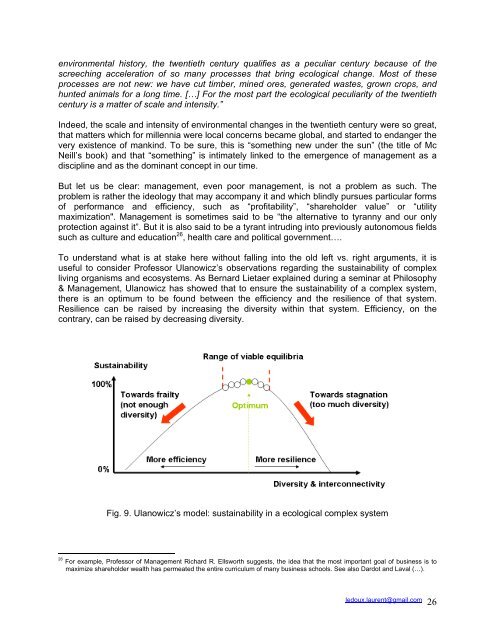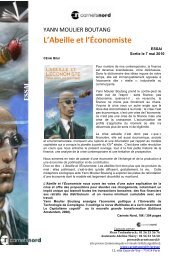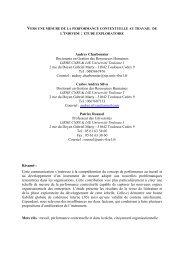Philosophy: The Managers - Philosophie Management
Philosophy: The Managers - Philosophie Management
Philosophy: The Managers - Philosophie Management
Create successful ePaper yourself
Turn your PDF publications into a flip-book with our unique Google optimized e-Paper software.
environmental history, the twentieth century qualifies as a peculiar century because of the<br />
screeching acceleration of so many processes that bring ecological change. Most of these<br />
processes are not new: we have cut timber, mined ores, generated wastes, grown crops, and<br />
hunted animals for a long time. […] For the most part the ecological peculiarity of the twentieth<br />
century is a matter of scale and intensity.”<br />
Indeed, the scale and intensity of environmental changes in the twentieth century were so great,<br />
that matters which for millennia were local concerns became global, and started to endanger the<br />
very existence of mankind. To be sure, this is “something new under the sun” (the title of Mc<br />
Neill’s book) and that “something” is intimately linked to the emergence of management as a<br />
discipline and as the dominant concept in our time.<br />
But let us be clear: management, even poor management, is not a problem as such. <strong>The</strong><br />
problem is rather the ideology that may accompany it and which blindly pursues particular forms<br />
of performance and efficiency, such as “profitability”, “shareholder value” or “utility<br />
maximization". <strong>Management</strong> is sometimes said to be “the alternative to tyranny and our only<br />
protection against it”. But it is also said to be a tyrant intruding into previously autonomous fields<br />
such as culture and education 26 , health care and political government….<br />
To understand what is at stake here without falling into the old left vs. right arguments, it is<br />
useful to consider Professor Ulanowicz’s observations regarding the sustainability of complex<br />
living organisms and ecosystems. As Bernard Lietaer explained during a seminar at <strong>Philosophy</strong><br />
& <strong>Management</strong>, Ulanowicz has showed that to ensure the sustainability of a complex system,<br />
there is an optimum to be found between the efficiency and the resilience of that system.<br />
Resilience can be raised by increasing the diversity within that system. Efficiency, on the<br />
contrary, can be raised by decreasing diversity.<br />
Fig. 9. Ulanowicz’s model: sustainability in a ecological complex system<br />
26<br />
For example, Professor of <strong>Management</strong> Richard R. Ellsworth suggests, the idea that the most important goal of business is to<br />
maximize shareholder wealth has permeated the entire curriculum of many business schools. See also Dardot and Laval (…).<br />
ledoux.laurent@gmail.com<br />
26
















